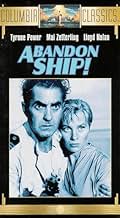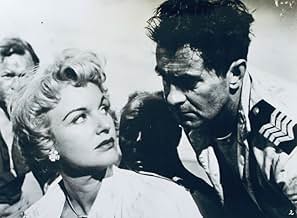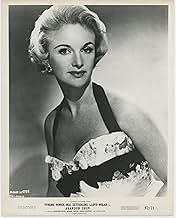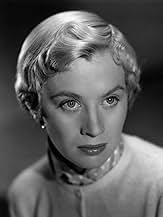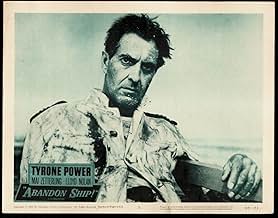Seven Waves Away
- 1957
- 1 घं 40 मि
अपनी भाषा में प्लॉट जोड़ेंAfter hitting a derelict mine in the Atlantic Ocean, a ship's officer finds himself in command of a lifeboat full of survivors of a sunken luxury liner. The survivors fight to stay alive whi... सभी पढ़ेंAfter hitting a derelict mine in the Atlantic Ocean, a ship's officer finds himself in command of a lifeboat full of survivors of a sunken luxury liner. The survivors fight to stay alive while exposed to savage seas and each other.After hitting a derelict mine in the Atlantic Ocean, a ship's officer finds himself in command of a lifeboat full of survivors of a sunken luxury liner. The survivors fight to stay alive while exposed to savage seas and each other.
फ़ीचर्ड समीक्षाएं
"Seven Waves Away" now ranks among one of my favorite films of all times. Why? Director Richard Sale does a phenomenal job directing a strong cast in such a small space. He creates a sense of claustrophobia that is unprecedented in the film industry. This film is the chapter missing from the over-budgeted disaster film "Titanic", which happily everyone shows up safe near the end. This is the human element of disaster, the choices that are made, and the difficulty of survival. This couldn't have happened without those playing their respective roles. Tyrone Powers was more than impressive as the designated master-in-command of this little boat full of scared people. When we first met him, as he assisted in others floating away from the wreckage, we can see that he is going to be a force in this film, and it isn't until he is pushed that we see the full potential of his character. He pushed himself away from any swashbuckling stereotypes that he was better known for, allowed water to be pushed into his face, and gave us a rugged performance that hasn't been seen for a very long time. It was due to Powers' portrayal that the others fell into their own characters as well. Others have argued that each character seemed cliché and at times racist, but to me, they all worked and fell into their roles respectively. The only one I had trouble believing was Mai Zetterling's portrayal of Powers' love interest and nurse. She was cardboard with lines, but worked with the others around her. She was tolerable because the actual story was powerfully near to perfection.
With the characters in place, a strong lead that obviously could control the darkening waters, all we needed to ensure was that there was a strong enough story to accompany these deserved moments. Thankfully, there was. "Seven Waves Away" was one of the tightest scripts that I have witnessed in a very long time. The camera shots were tight, the special effects were 50s style, but perfection in every direction, and the bleak tones were what kept me on the edge of my seat each minute of this film. There is something about a film, especially one made in the 50s that shows unfortunate people just floating out to their death. There is also something about the power of a film that isn't afraid to be honest to itself. "Seven Waves Away" was honest; the horrid nature of Powers saying "women and children don't mean anything anymore" had my heart racing. He was powerful, yet torn all at the same time. He carried a burden none of us would probably be willing to do, and oddly, he was hurt for it. The ending of this film is really what pulled it together for me. The excitement of the crew turned to a wicked shade of turnip at the first signs of possible safety. The honesty of this film is what struck the chord with me. It was powerful and real all at the same time. There wasn't time for cheap CGI or pathetic special effects, this was a human driven film, and it worked because they were all characters we either believed in or have once known. Which would you have been if you were in this boat one of the strong or one of the weak? This is a conversation that I could have with anyone after viewing this film, and it is conversation that launches this film into my immediate favorites.
Overall, I don't think my words gave this film credit at all. It was, again, one of those rare films that should never go out of print, but remain a staple in our cinematic community. Tyrone Powers is superb, and Richard Sale gives us a story nearly worthy enough of Hitchcock. I still get goose bumps as I think about Powers making the final decision on those that are considered "dead weight". This film carried a heavy theme and wasn't afraid to show it to the world. It is a real film about honest events and the truth behind humanity, it speaks further truth now, and would make for a great re-interpretation if not Hollywood-ized too much. I cannot suggest this film enough. If ever you find yourself with a bit more money in the wallet, this film is the perfect investment for your collection. A beauty from beginning to end.
Grade: ***** out of *****
They probably filmed most of this in a giant water tank but it looks like it's the open ocean. The boat always looks dangerously close to sinking and the waters get really rough. This is actually a very harrowing tale. The high stress situation is great for pulling out the characters. There is something basic about their predicament. It is primal. The story is very compelling.
The movie's, one and only, set is a small boat on the ocean. This happens as we are told a ship hits an old sea-mine and breaks the keel. Thus, making the ship sinks in minutes with few people surviving. We are not privy to see how the ship sank nor how the characters get into the water as the film begins after the sinking. The first bit of dialog starts as characters are already clinging to floating wreckage.
The rest of the movie all happens in the ocean. Here, Alec Holmes (Powers), will be in charge of a small boat that has way too many people aboard. Holmes makes the decision that some have to go-- and this brings us to the plot of the story.
The entire movie hinges on Power's ability to hold the audience's attention for nearly 90 minutes. Tyrone Powers accomplishes this task by giving a powerful performance. The only drawback of the movie are some of the small scenes that were overplayed for dramatic effect. It happens right at the beginning as two survivors cope with the sinking and lost of love ones. Another is when the radio operator tells that he never sent out a SOS message - and then near the end when one person wants to drown but is saved by others. Otherwise an enjoyable film to watch.
I'm sorry one of the posters didn't find him sexy. That man oozed sex from every pore of his body - just ask anyone who came within two feet of him, including his costar in this film, Mai Zetterling. Their torrid affair is discussed in vivid, oh so vivid detail in her autobiography - a whole 18-page chapter.
Sex aside, this film comes off as a great deal grittier than Lifeboat. For me, Tallulah Bankhead was so dazzling in Lifeboat, much of the focus was on her, which somehow dissipated a lot of the tragedy.
The two films are similar, though, on some plot points. However, due to Bankhead, there was some humor in Lifeboat. Abandon Ship/Seven Waves Away has none.
The film will keep you glued to your seat, but it is not easy to take, as it is unrelenting in its message and harrowing scenes. You will suffer along with each person who is sacrificed so that others may live.
It's great to see Tyrone Power in a meatier role, and I do believe his career would have taken some exciting turns, both on stage and screen, had he lived past the age of 44. His face was a total curse (to him only) and got in the way of serious acting pursuits for years.
His performance in Abandon Ship is excellent and stands as one of his best. There are other films where he had a tendency to tighten up, but this wasn't one of them.
It's a shame about him - like so many men of that era, he always had a cigarette in his hand; in Power's case, it was suspected he had heart trouble, but he was in denial about it and didn't want it verified. So we're stuck with what work of his we have, and a lot of it is pretty darn good.
** According to Mai Zetterling's book, All Those Tomorrows, the cast sat in a boat floating in a large indoor tank at Shepperton Studios. There were wind and wave machines and a watershoot pouring cold water on the cast. A starting pistol had to be used to start action as there was no way to hear the director. In the end, the whole film was dubbed because no one could hear.
क्या आपको पता है
- ट्रिवियाThis movie is based on the real event of the William Brown, an American ship that sank in 1841, taking with her 31 passengers. A further 16 passengers were forced out of an overloaded lifeboat before the survivors were rescued. The survivors were picked up by the American ship Crescent, the same name of the liner that sinks in this movie.
- गूफ़The boat used in long shots and the one in close-ups are obviously different.
- भाव
Announcer: [closing lines] The story which you have just seen is a true one. In real life Captain Alexander Holmes was brought to trial on a charge of murder. He was convicted and given the minimum sentence of six months because of the unusual circumstances surrounding the incident. If you had been a member of the jury, how would you have voted: guilty or innocent?
- कनेक्शनRemade as The Last Survivors (1975)
टॉप पसंद
विवरण
- रिलीज़ की तारीख़
- कंट्री ऑफ़ ओरिजिन
- भाषा
- इस रूप में भी जाना जाता है
- El mar no perdona
- फ़िल्माने की जगहें
- Shepperton Studios, Shepperton, सरी, इंग्लैंड, यूनाइटेड किंगडम(Gus Angus worked as Third Assistant Director and confirmed the film was shot on H Stage also known as the Silent Stage at Shepperton.)
- उत्पादन कंपनी
- IMDbPro पर और कंपनी क्रेडिट देखें
- चलने की अवधि
- 1 घं 40 मि(100 min)
- रंग
- पक्ष अनुपात
- 1.85 : 1

